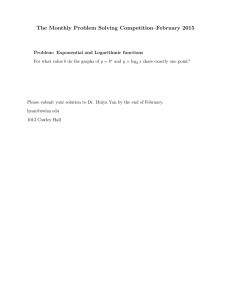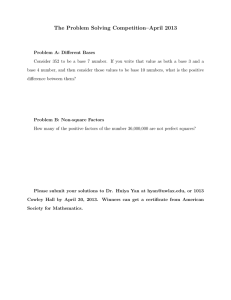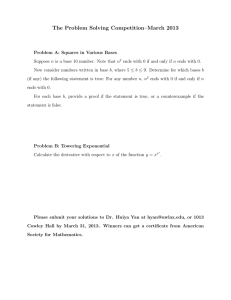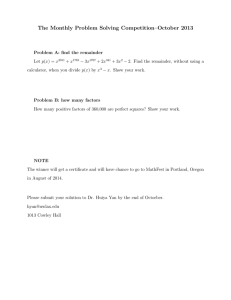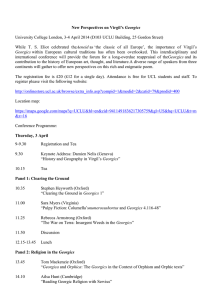Abraham Cowley (1618-1667) was educated at Westminster School and Trinity
advertisement
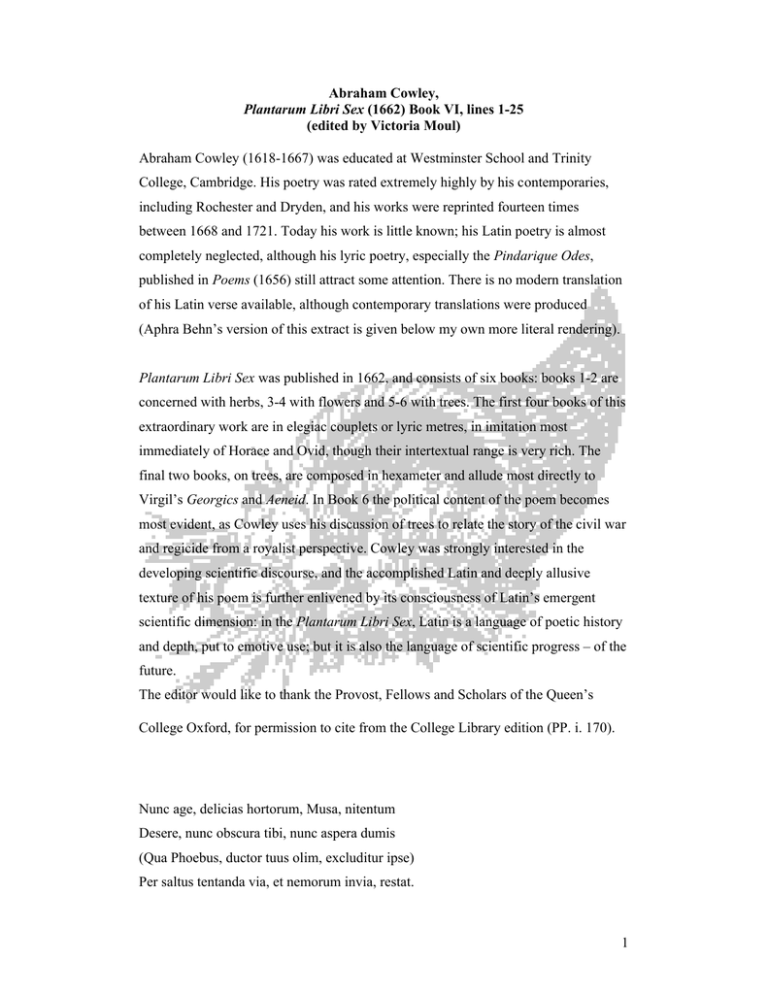
Abraham Cowley, Plantarum Libri Sex (1662) Book VI, lines 1-25 (edited by Victoria Moul) Abraham Cowley (1618-1667) was educated at Westminster School and Trinity College, Cambridge. His poetry was rated extremely highly by his contemporaries, including Rochester and Dryden, and his works were reprinted fourteen times between 1668 and 1721. Today his work is little known; his Latin poetry is almost completely neglected, although his lyric poetry, especially the Pindarique Odes, published in Poems (1656) still attract some attention. There is no modern translation of his Latin verse available, although contemporary translations were produced (Aphra Behn’s version of this extract is given below my own more literal rendering). Plantarum Libri Sex was published in 1662, and consists of six books: books 1-2 are concerned with herbs, 3-4 with flowers and 5-6 with trees. The first four books of this extraordinary work are in elegiac couplets or lyric metres, in imitation most immediately of Horace and Ovid, though their intertextual range is very rich. The final two books, on trees, are composed in hexameter and allude most directly to Virgil’s Georgics and Aeneid. In Book 6 the political content of the poem becomes most evident, as Cowley uses his discussion of trees to relate the story of the civil war and regicide from a royalist perspective. Cowley was strongly interested in the developing scientific discourse, and the accomplished Latin and deeply allusive texture of his poem is further enlivened by its consciousness of Latin’s emergent scientific dimension: in the Plantarum Libri Sex, Latin is a language of poetic history and depth, put to emotive use; but it is also the language of scientific progress – of the future. The editor would like to thank the Provost, Fellows and Scholars of the Queen’s College Oxford, for permission to cite from the College Library edition (PP. i. 170). Nunc age, delicias hortorum, Musa, nitentum Desere, nunc obscura tibi, nunc aspera dumis (Qua Phoebus, ductor tuus olim, excluditur ipse) Per saltus tentanda via, et nemorum invia, restat. 1 Eia age venatrix, densas penetremus in umbras, 5 Intima scrutemur viridantum lustra dearum. Solve mihi ingenium pede velox, solve sagacis Iudicium naris. Facundia libera currat, Naturamque premat laeto clamore latentem. Tende plagas mentis, subtilia retia tende, 10 Et magna constringe fugax indagine verum. Hic tuus est venatus, et haec tua sola ferina. Sed neque te pudeat pomaria ditia sylvis Pauperibus mutasse. Habitarunt numina sylvas, Forsan et hic habitent. Habitavit proximus illis 15 Carolides, nemoris dono tutatus opaci Augustum caput, et nulli violabile Parcae. Huc ades, o dilecte Deo! Sacrum tibi lucum Pangimus, aeterni pubentem veris honore. Tu mihi, tu praesens frondosi carminis ipse 20 Numen adesto, tuamque volens hic incole quercum Quam tibi longaevam statuo. Non illa latebras Perfugiumque dabit, sed victor fronde sedebis Servatam ob patriam redimitus tempora querna, Fulgebisque altus, totique videberis orbi. 25 Come now, Muse, abandon the pleasures of bright gardens, Now the task that awaits you is this: to attempt instead the dark paths, rough with brambles (Where even Phoebus himself, who was once your guide, is shut out) Amid the groves, and the trackless ways of the woods. Oh come now, huntress, let’s make our way in among the close-packed shades 5 And investigate the inmost lairs of the verdant goddesses. Let loose my swift-footed imagination, let loose my judgement With its keen nose. Let free speaking eloquence run forth And pounce upon hidden nature with a cry of joy. Spread the traps of your mind, spread their fine nets, 10 2 And snare truth as she flees by encircling her all about. This is your hunt, and these are your only wild prey. But don’t be ashamed to exchange rich orchards For impoverished woodlands. Ancient powers have dwelt in woods, And perhaps they shall dwell here. Most recently there dwelt in these woods 15 Charles; protected by the grove’s gift of shade Was his noble head, no Fate could threaten it. You came hence, O man beloved of God! We laid open the sacred grove For you, growing strong as we did so in the glory of eternal truth. Be near me now as a guardian spirit for a branched song, 20 Be close to me, and, if you will, inhabit your oak here: The long-lived oak I set up for you. She will not Offer coverts or refuge in your flight – instead you will be seated as a victor on a bough And for saving our native land your temples shall be crowned with oak. You shall shine on high and the whole world shall see you. 25 Commentary Line 4: tentanda via, et nemorum invia: compare the proem to Book III of Virgil’s Georgics, lines 8-9: ‘tentanda via est, qua me quoque possim / tollere humo victorque; virum volitare per ora’ ("I must attempt a path by which I too can lift myself heavenward and, as victor, fly on human lips"). In this proem Virgil, like Cowley, proclaims the originality of his subject and its treatment. Line 5: densas . . . umbras: in Virgil, umbra evokes both the shades of the dead in the underworld, and also the ‘shade’ of trees, a force both benign (under which shepherds sing) and hostile in the Eclogues, the final lines of which characterise ‘umbra’ as ‘gravis’ (‘heavy’ or ‘dangerous’). By suggesting that he and the Muse should make their way in ‘among the close-packed shades’ Cowley suggests both the literal deep shade of thick woodland, and the dense ranks of his poetic forbears. Line 7-11: The metaphor here is of hunting: the hunter (the Muse working with the poet) sets forth his dogs (his judgement and imagination) upon the hunted prey – in this case truth. The technical language of hunting is a conceit appropriate to the woodland setting, and also to the didactic genre invoked by the allusions to the Georgics and the Ars Amatoria. 3 Line 10: Tende plagas mentis: Compare Ovid, Ars Amatoria, Book 1: ‘prima tuae menti veniat fiducia, cunctas / posse capi: capies, tu modo tende plagas’ (‘First you should be confident, that all women / Can be won: you’ll win, if you merely lay out your snares’, 269-270). The texts are connected by their didactic form as well as the hunting metaphor. Line 17: Augustum caput: this is an accusative of respect: Charles is protected (tutatus) ‘in respect of’ his noble head. The construction, and the position of the phrase at the beginning of the line, emphasises the king’s dignity, and the importance of his position as ‘head of state’. There is irony here too: the shade of the grove protects his head as his father’s was not – Charles I had been beheaded two years earlier, in 1649. Line 18: Huc ades: Cowley invokes the protection and patronage of Charles as a guardian spirit for his song. This move parallels that of the opening lines of Georgics III, addressed first to classical gods, and then dedicated to Caesar Augustus. Line 21: quercum: Charles is supposed to have hidden in the Royal Oak at Boscobel House after royalist defeat at Worcester in 1651. Lines 22-3: latebras / perfugiumque dabit: After the defeat of the royalist Scottish army at Worcester on 3 September, 1651, Charles spent six weeks evading capture in England, despite the large reward offered for him. He eventually escaped by sea at Shoreham. Versions of this dramatic period, filled with stories of disguise and narrow escapes, were widely retold. Cowley’s point is that the oak in these lines will no longer have to provide such a refuge or hiding-place: instead he imagines the king enthroned upon it in glory. OF PLANTS, BOOK VI Translated by Aphra Behn Cease, o my Muse, the soft delights to sing Of flowry gardens in their fragrant spring, And trace the rougher paths of obscure woods, All gloom aloft, beneath oe’rgrown with shrubs, Where Phoebus, once thy guide, can dart no ray 5 T’inspire thy flight, and make the scene look gay. Courage, my huntress, let us range the glades, And search the inmost grottos of the shades. 4 Even to the lone recesses let us pass, Where the green goddess rests on bed of moss. 10 Let loose, my fancy, swift of foot to trace With a sagacious scent the noble chase, And with a joyful cry pursue the prey, ’Tis hidden nature we must rouse today. Set all your gins, let every toil be plac’d 15 Through all her tracks let flying truth be chas’d, And seize her panting with her eager hast. Nor yet disdain, my Muse, in groves to range, Or humbler woods for nobler orchards change. Here deities of old have made abode, 20 And once secur’d great Charles our earthly god. The royal youth, born to out-brave his fate, Within a neighbouring oak maintain’d his state. The faithful boughs in kind allegiance spread Their sheltring branches round his awful head, 25 Twin’d their rough arms, and thicken’d all the shade. 5

